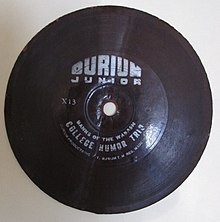Durium

Durium is a highly durable synthetic resin developed in 1929. It was used in phonograph records, as well as in the casting process for metallic type and in the aeronautics industry.
Origin
It is a resorcinol-formaldehyde resin, the result of research by Hal T. Beans, professor of chemistry at Columbia University.[1]
Properties
The resin is flexible, tasteless, odorless, fire and waterproof. It is highly resistant to heat and was heated to 230 °C (446 °F) in production of records. It is fast-setting, reducing the production cost of items made from it.
Applications
Being resistant to fire and water, the resin was used as a substitute for varnish on aeronautical parts.
It was commercialized by Durium Products Company (renamed Durium Products, Inc., from 1931) as the medium for Hit of the Week records, from 1930 to 1932. The resin was bonded to a cardboard substrate and, being much lighter than its competitor shellac, was sold at newsstands for only 15 cents per disc.[2]
References
- ^ "Unbreakable Disks Made of New Resin; Phonograph Records, Flexible and Cheap, Use Durium, Product of Dr. H.T. Beans. Unhurt by Hammer Blows: Compound Which Withstands Heat of Molten Lead Expected to Find Many Industrial Uses". The New York Times. January 4, 1930. Retrieved March 30, 2018.
- ^ "Science: Durium Records". Time. February 17, 1930. Retrieved March 30, 2018.
